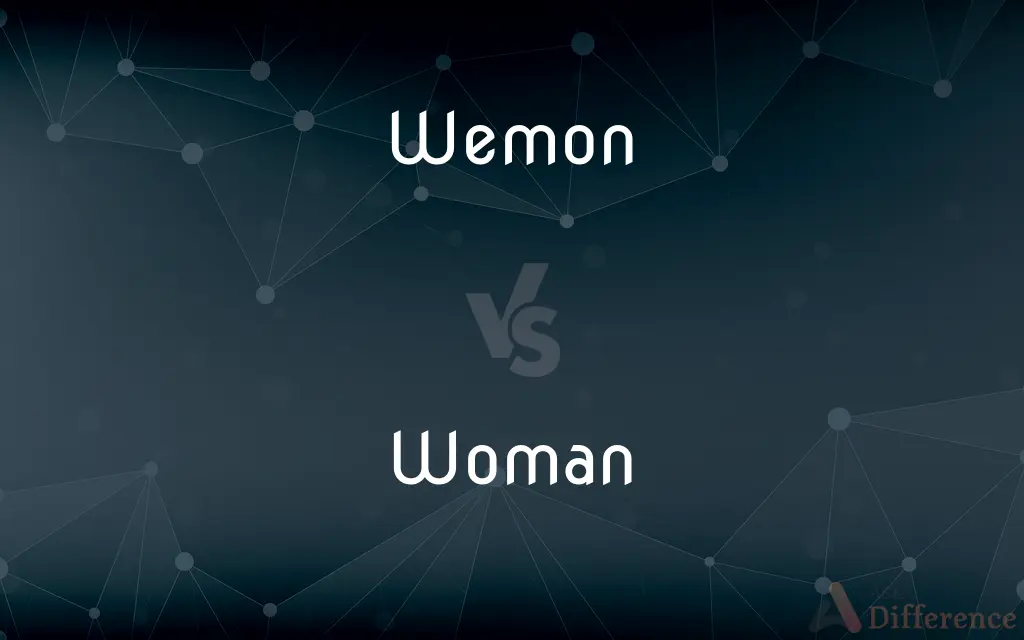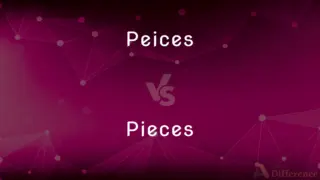Wemon vs. Woman — Which is Correct Spelling?
Edited by Tayyaba Rehman — By Fiza Rafique — Updated on March 29, 2024
"Wemon" is an incorrect spelling. The correct spelling is "Woman," which refers to an adult female person.

Table of Contents
Which is correct: Wemon or Woman
How to spell Woman?

Wemon
Incorrect Spelling

Woman
Correct Spelling
ADVERTISEMENT
Key Differences
“Woman” is singular; remember the singular form has no "e".
Only one "o" in the correct spelling.
"Woman" has "man" in it, with a "wo" prefix.
Think of "woe + man," though "woe" has a different meaning.
"Wemon" looks like "demon" but a "woman" is not.
ADVERTISEMENT
How Do You Spell Woman Correctly?
Incorrect: Each wemon has a unique story to tell.
Correct: Each woman has a unique story to tell.
Incorrect: That wemon is the CEO of a large corporation.
Correct: That woman is the CEO of a large corporation.
Woman Definitions
The female gender, contrasted to "man".
She is a strong, independent woman.
An adult female human being.
The woman walked gracefully into the room.
Represents the feminine qualities or characteristics.
She is the epitome of womanhood.
A wife or female partner.
She is his woman.
An adult female human.
Women considered as a group; womankind
“Woman feels the invidious distinctions of sex exactly as the black man does those of color” (Elizabeth Cady Stanton).
An adult female human belonging to a specified occupation, group, nationality, or other category. Often used in combination
An Englishwoman.
Congresswoman.
A saleswoman.
A female servant or subordinate.
A wife.
A female lover or sweetheart. See Usage Notes at chairman, female, lady, man.
(collective) All female humans collectively; womankind.
A female person, usually an adult; a (generally adult) female sentient being, whether human, supernatural, elf, alien, etc.
A wife (or sometimes a fiancée or girlfriend).
A female person who is extremely fond of or devoted to a specified type of thing. Used as the last element of a compound.
A female attendant or servant.
To staff with female labor.
(transitive) To make effeminate or womanish.
(transitive) To furnish with, or unite to, a woman.
(transitive) To call (a person) "woman" in a disrespectful fashion.
Of or relating to a woman/women; female.
An adult female person; a grown-up female person, as distinguished from a man or a child; sometimes, any female person.
Women are soft, mild pitiful, and flexible.
And the rib, which the Lord God had taken from man, made he a woman.
I have observed among all nations that the women ornament themselves more than the men; that, wherever found, they are the same kind, civil, obliging, humane, tender beings, inclined to be gay and cheerful, timorous and modest.
The female part of the human race; womankind.
Man is destined to be a prey to woman.
To act the part of a woman in; - with indefinite it.
To make effeminate or womanish.
To furnish with, or unite to, a woman.
An adult female person (as opposed to a man);
The woman kept house while the man hunted
Women as a class;
It's an insult to American womanhood
Woman is the glory of creation
A human female who does housework;
The char will clean the carpet
A female person who plays a significant role (wife or mistress or girlfriend) in the life of a particular man;
He was faithful to his woman
Woman Meaning in a Sentence
Every woman has the right to education and employment.
The woman who spoke at the conference inspired many.
The first woman to climb Mount Everest showed remarkable courage.
That woman has broken many barriers in her career.
The woman in the painting is thought to be a prominent figure from the Renaissance.
Common Curiosities
Which vowel is used before Woman?
The vowel "o."
What is the verb form of Woman?
"Woman" does not have a specific verb form.
Why is it called Woman?
It derives from Old English "wīfmann," where "wīf" means female and "mann" means human.
What is the pronunciation of Woman?
/ˈwʊmən/
What is the singular form of Woman?
Woman.
What is the root word of Woman?
"wīfmann" from Old English.
Which conjunction is used with Woman?
No specific conjunction is tied to "woman."
Is Woman a noun or adjective?
Noun.
What is the plural form of Woman?
Women.
Which article is used with Woman?
Both "a" and "the" can be used, depending on context.
Is Woman an adverb?
No.
Which preposition is used with Woman?
"Of," as in "woman of distinction."
Is Woman a vowel or consonant?
"Woman" is a word, not a single letter.
Is Woman a negative or positive word?
Neutral; it's a descriptive noun.
Is Woman a countable noun?
Yes.
Is Woman a collective noun?
No.
Is the Woman term a metaphor?
Not inherently, but can be used metaphorically.
Is the word Woman imperative?
No.
Is Woman an abstract noun?
No.
How many syllables are in Woman?
Two.
How do we divide Woman into syllables?
Wo-man.
What is a stressed syllable in Woman?
The first syllable, "Wo."
How is Woman used in a sentence?
"The woman stood confidently at the podium."
Is the word “Woman” a Direct object or an Indirect object?
It can serve as either, depending on the sentence structure.
What part of speech is Woman?
Noun.
What is another term for Woman?
Female.
What is the opposite of Woman?
Man.
Which determiner is used with Woman?
"That," "this," etc., depending on context.
What is the second form of Woman?
Not applicable, as "woman" is a noun.
What is the third form of Woman?
Not applicable, as "woman" is a noun.
Is the word Woman a gerund?
No.
What is the first form of Woman?
Not applicable, as "woman" is a noun.
Share Your Discovery

Previous Comparison
Peices vs. Pieces
Next Comparison
Alot vs. A LotAuthor Spotlight
Written by
Fiza RafiqueFiza Rafique is a skilled content writer at AskDifference.com, where she meticulously refines and enhances written pieces. Drawing from her vast editorial expertise, Fiza ensures clarity, accuracy, and precision in every article. Passionate about language, she continually seeks to elevate the quality of content for readers worldwide.
Edited by
Tayyaba RehmanTayyaba Rehman is a distinguished writer, currently serving as a primary contributor to askdifference.com. As a researcher in semantics and etymology, Tayyaba's passion for the complexity of languages and their distinctions has found a perfect home on the platform. Tayyaba delves into the intricacies of language, distinguishing between commonly confused words and phrases, thereby providing clarity for readers worldwide.


































